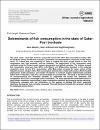Determinants of fish consumption in the state of Qatar: Post blockade
التاريخ
2020-11البيانات الوصفية
عرض كامل للتسجيلةالملخص
This study used a count data model to analyse the factors that affect fish consumption in Qatar after
the blockade; aiming for effective evaluation, formulation and implementation, of policies for the fishery
sector. To achieve this, the community of Qatar is divided into three groups based on their fish
consumption rate: high, moderate, and low consumer. The determinants of fish consumption were
confirmed using the Poisson model, namely demographic and attitude variables. The findings showed
that consumption rates were high (90%); both Qataris and White-collars belonged to the moderate
consumers group (52 and 41%, respectively), while Blue-collars occupied the larger portion of the
highest consumer category (36%). Fish consumption determinants in Qatar with positive effect included
employment, health awareness, and number of children; in contrast, negative determinants included
higher level of education, high price, and accessibility to purchase fish. The study is the first to focus
on socio-economics and attitudinal variables to understand the factors that determine fish
consumption that in turn, encourages policy formulation. The study supports the government policy to
open foreign investment opportunities to meet consumption demands and preserve marine resources.
Furthermore, managers may use information on fish species to manage fish stock, especially
identifying fish species that are highly consumed. They will therefore formulate the necessary policies
for sustainable marine fishery
المجموعات
- الأبحاث [297 items ]


